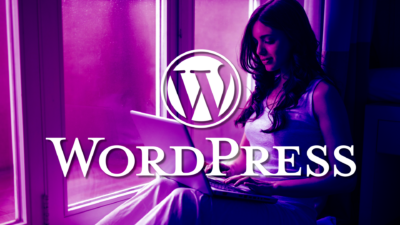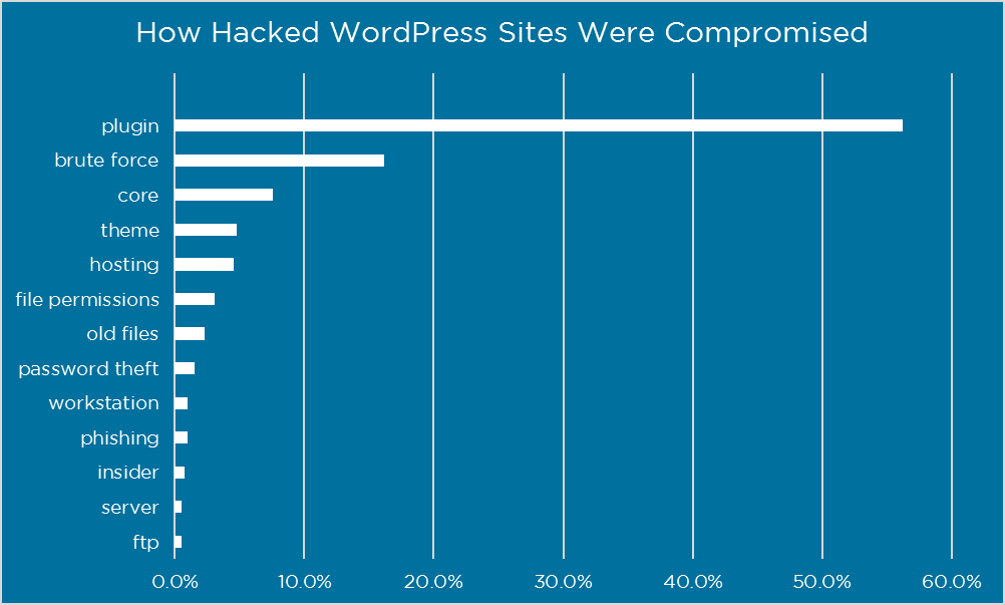Inhaltliche Navigation
WordPress at a glance


Intro
In the world of web design and content creation, choosing the right content management system (CMS) is crucial. To avoid constant headaches when making changes to your website in the future, the decision should be carefully considered. As experts in online wizardry, we know what's important and go to great lengths to choose a CMS that puts your needs front and centre.
And so welcome to the second part of our "[CMS] at a glance" series. In the last part, we looked at Craft CMS, which impresses with its clarity, fast loading times and security. Let's now take a look at a CMS that - whether intentionally or unintentionally - has focussed more on the masses and "no-code" design over the last few years: WordPress.
Today we would like to take a closer look at this CMS with you and see when it makes sense to use it for your website. We want to take you on a journey to discover the diverse functions of this powerful system.
What is WordPress?
WordPress is a free, open-source content management system (CMS) software for websites. It is based on the PHP programming language and was originally released in 2003 for creating blogs. It allows end users to easily create, edit and publish content without in-depth web development knowledge. With many themes and plugins, it is customisable and popular with bloggers, small and large businesses.
Despite its popularity, Wordpress also faces criticism. Security concerns and performance issues are the most common worries. Some also criticise the dependence on plugins and the "bloated" backend. Nevertheless, it remains a widely used platform whose potential problems can be minimised through careful use.
An overview of the most important features
Countless customisation options, templates and plugins - WordPress offers a huge range of possibilities for your online presence. Let's dive into the details together and find out why so many are enchanted by the magic of the WordPress CMS.
Free of charge
For many, the most important feature: WordPress is available free of charge and is subject to the GNU General Public Licence (GPL). This means that it is free to download, install, use and customise. This open-source nature of WordPress has contributed to its widespread popularity.
Although the WordPress software itself is free, there may still be some associated costs. For example:
- Domain and hosting
- Premium themes
- Premium plugin versions
- Professional support
Themes
WordPress themes are design templates that control the appearance and presentation of a WordPress website. They influence the layout, colour schemes, fonts, images and other visual elements. You can install and set them up relatively easily, but no two themes are the same and some are easier to use than others.
Plugin-Store
The plugin store is huge. Anyone can add plugins there and you can then install them with just a few clicks. Whether plugins for contact forms, SEO plugins, newsletter plugins or performance plugins, (almost) everything is available. However, you should always make sure that the plugin is really good, as - as already mentioned - anyone can upload their plugins there.
Multilingualism
WordPress offers multilingual support through the integration of language files and the use of third-party plugins. You can create and manage content in different languages to create an internationally orientated website.
Blog and comment function
WordPress was originally developed as a blogging platform and therefore offers robust blogging features, including easy post creation, categorisation and archiving. The comment function allows readers to reply to posts.
Large community
WordPress has a large and active user community that provides a wealth of resources, forums and tutorials. This vibrant community contributes to the continuous development, support and improvement of the platform. Due to the enormous size of the WordPress community, support can be confusing and the quality of advice and answers can vary greatly.
However, as with any tool, there are pros and cons to consider. Before you delve into the world of WordPress, it's important to understand these aspects. The advantages are obvious, from the ease of use to the large community. But we also can't overlook the potential downsides, such as security risks and performance limitations. In this section, we'll take a look at the pros and cons of WordPress to help you make an informed decision for your next online project.
What speaks against WordPress?
Disadvantages such as security risks and performance restrictions, particularly due to the installation of (too many) plugins, must be taken into account. In addition, the high administrative effort involved in updating and checking the site on a daily basis can be time-consuming and cause high costs.
- Confusing: WordPress can be confusing for beginners at first, especially if many themes and plugins are used. The multitude of options can lead to a certain complexity.
- Performance issues: With insufficient optimisation and the use of numerous plugins, WordPress websites can load more slowly, which can affect the user experience.
- Constant updates: The regular updates of WordPress can be a nuisance for some users, as they require additional maintenance to ensure compatibility with themes and plugins.
- Very unstable over time: As the number of installed themes and plugins increases, there is a possibility that the stability of the website will be affected, especially if they are not regularly maintained.
- Time and cost-intensive: The customisation and maintenance of an extensive WordPress website can be time-consuming, especially if extensive adjustments or developments are required.
What speaks in favour of WordPress?
Like any other CMS, WordPress offers clear advantages: Such as "low-code / no-code" approaches for people without programming skills, a large community and countless extension options are top of the list. With WordPress, you can create and manage your website with ease.
- Free of charge: WordPress is a free and open-source software, which makes it a cost-effective option for many users to create and run websites. However, you should be careful: Paid themes and plugins, site maintenance, a hacker attack or data leaks, bug fixes after failed updates... All of this can lead to high costs.
- Simplicity: You can easily create, edit and publish content even without programming skills or prior technical knowledge and get started relatively quickly. However, the initial set-up is not quite so simple and can quickly give new users a headache.
- Flexibility and customisability: WordPress offers remarkable flexibility, allowing you to design your website to your liking. With thousands of themes and plugins, you can customise and expand your online presence without having to delve deep into the technology. In most cases, everything can be accessed and installed with just a few clicks.
- Expandability: The system can be expanded using plugins or your own code. However, it can also quickly become overloaded, which could cause users to lose the overview.
Is Wordpress secure?
"Security in WordPress is taken very seriously, but as with any other system there are potential security issues that may arise if some basic security precautions aren’t taken. This article will go through some common forms of vulnerabilities, and the things you can do to help keep your WordPress installation secure." - WordPress
So basically, WordPress is just as secure as other CMSs. However, due to its widespread use, it is an attractive target for hackers. Security vulnerabilities can occur, especially if themes and plugins are not updated regularly or if security guidelines are not followed carefully. In addition, the plugins in the plugin store are not subject to any controls and therefore offer easy targets for hackers.

Source: Wordfence
However, the security of a WordPress site can be greatly improved if you pay attention to a few things and set up the system correctly. These include, among others:
- Hosting server security: Firewall, encrypted protocols, user permissions
- Strong passwords with special characters, numbers and upper and lower case letters
- Third-party plugins: less is more! With every additional plugin, the chance of potential security vulnerabilities also increases.
- A security plug-in such as Wordfence
- Regular updates of themes and plugins, as well as uninstalling unused ones
- Employee training programmes
Paying attention to these points is half the battle and makes it much more difficult for attackers. In combination with regular backups, you can greatly minimise the risk of extensive data loss.
The future of WordPress
We believe that WordPress will remain on the market for many years to come and will probably continue to evolve (to some extent). It will probably be difficult to get rid of the "bloatware" status, as WordPress has now become an "egg-laying wool-milk sow". Most developers are now more concerned with patching things up and mainly act reactively. Proactivity and innovation have unfortunately been lost over the years.
Nevertheless, WordPress will continue to play a significant role in the world of web development and content management due to its existing user base and its "low-code / no-code" approach.
However, it is important to note that the technology landscape is constantly changing and new platforms and approaches may emerge.
Conclusion
WordPress is undoubtedly a good tool for web development and content management that can turn your creative ideas into reality. However, it is important to note that it is not always the best choice. For more extensive or specific projects, better alternatives could be considered. However, for smaller projects with low requirements, it can be a good choice.
Choosing the right CMS always depends on your individual needs and goals. We are here to help you find the best solution for your online project.
You can find more information at: https://wordpress.com/ or during a detailed consultation with us.
